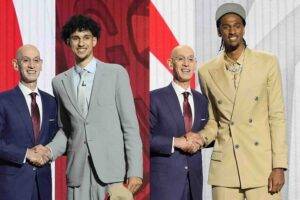What Are The New NBA Salaries?
Discover the latest figures in the world of NBA salaries. Explore the factors influencing player earnings, salary cap determination, and different types of contracts. Stay up to date on the financial landscape of the sport.

Imagine being on the edge of your seat, eagerly waiting to know the latest figures in the world of NBA salaries. With the game constantly evolving, it's natural to wonder about the new contracts that our favorite athletes have signed. Whether you're a die-hard basketball fan or simply curious about the ever-changing financial landscape of the sport, this article will provide you with the up-to-date information on what the new NBA salaries are and how they are shaping the future of the game. Hold onto your basketball hats, because we're about to dive into a captivating journey through the world of elite athletes and their staggering paychecks
Introduction
The NBA has recently seen a significant increase in its salary cap, resulting in a major impact on player salaries across the league. This increase in the salary cap has brought various factors into play when determining a player's earnings. In this article, we will explore the factors that affect NBA salaries, how the salary cap is determined, and the different types of contracts available to players.
Factors Affecting NBA Salaries
Performance
One of the key factors that affect NBA salaries is a player's performance on the court. Players who consistently perform at a high level and contribute significantly to their team's success are often rewarded with higher salaries. The better a player's stats, such as points scored, assists, rebounds, and defensive statistics, the more valuable they are considered in the eyes of teams and therefore the higher their salary potential.
Experience
Experience is another important factor that influences NBA salaries. Players who have proven themselves over multiple seasons and have accumulated a wealth of experience in the league are often rewarded with bigger contracts. Teams value the leadership, knowledge, and decision-making abilities that come with experience, which can significantly boost a player's earning potential.
Marketability
In addition to on-court performance and experience, a player's marketability plays a crucial role in determining their salary. The NBA is not only a sport but also a business, and players who have a strong appeal to fans and brands alike often command higher salaries. Factors such as popularity, endorsement deals, social media following, and jersey sales can contribute to a player's marketability and ultimately impact their earnings.
Determining Salary Cap
Basketball Related Income (BRI)
The salary cap in the NBA is determined using a formula based on the Basketball Related Income (BRI) of the league. BRI includes various revenue streams such as ticket sales, merchandise sales, broadcast rights, and sponsorships. A percentage of the BRI is allocated for player salaries, with the remaining amount going towards league expenses and profit distribution.
Cap calculations
Once the BRI is determined, the league applies a specific percentage to calculate the salary cap. This percentage is negotiated between the NBA and the NBA Players Association (NBAPA) before each season. It typically aims to balance the financial stability of teams while ensuring players receive a fair share of league revenues. The salary cap then serves as the maximum amount teams can spend on player salaries for that season.
Rookie Scale Salaries
Draft position
For rookies entering the NBA, their draft position plays a crucial role in determining their salaries. The higher the player is selected in the NBA Draft, the more lucrative their rookie contract will be. First-round picks receive guaranteed contracts with predetermined salary amounts based on their draft position, while second-round picks negotiate their salaries with their respective teams.
Scale amounts
The NBA has established a scale that dictates the salaries for first-round picks based on their draft position. Each pick is assigned a specific salary amount for the first two years of their contract, with subsequent years allowing for negotiations. Higher draft picks receive higher salaries, reflecting the higher expectations placed upon them and the potential impact they are expected to have on their teams.
Veteran Minimum Salaries
Years of experience
Veteran players who have been in the league for a certain number of years are subject to minimum salary amounts, also known as the veteran minimum. The more experience a player has, the higher their minimum salary will be. This ensures that long-serving players are compensated fairly for their contributions to the game, while also allowing teams with limited salary cap space to fill their rosters with experienced players.
Minimum salary amounts
The NBA sets specific minimum salary amounts for players based on their years of experience. These amounts are subject to change each season and can vary depending on the collective bargaining agreement between the league and the NBAPA. The veteran minimum provides a baseline salary for players who have dedicated years to the game and ensures they are compensated appropriately.
Maximum Salary Cap
Years of experience
Similar to veteran minimum salaries, the maximum salary cap varies depending on a player's years of experience. As players progress through their careers and accumulate more years in the league, they become eligible for higher maximum salary amounts. This ensures that star players are rewarded for their consistent performance over the years and gives them the opportunity to earn a larger share of the team's salary cap.
Percentage of salary cap
The maximum salary cap is calculated as a percentage of the team's salary cap. This percentage is determined based on the length of a player's NBA tenure. The more experience a player has, the higher the percentage of the team's salary cap they can earn. This system allows teams to allocate a significant portion of their salary cap to their star players while maintaining flexibility to build a competitive roster.
Supermax Contracts
Eligibility criteria
Supermax contracts are a special type of contract available to NBA players who meet specific eligibility criteria. To be eligible for a supermax contract, a player must have completed a certain number of seasons with the team that originally drafted them or with whom they have been traded. This type of contract aims to incentivize players to stay with their original franchise and rewards their loyalty and exceptional performance.
Additional salary
The supermax contract allows eligible players to earn additional salary above what they would typically receive under the maximum salary cap. The additional salary can be a significant increase, providing a financial incentive for players to commit to their teams long-term and prioritize team success over potentially earning more money by moving to another franchise.
Mid-Level Exception
Limited exceptions
The mid-level exception is a mechanism that provides teams with limited salary cap space the ability to sign or re-sign players. It allows teams to exceed the salary cap to a certain extent, providing them with more financial flexibility when constructing their rosters. The mid-level exception is typically used to attract or retain role players who can contribute to a team's success without exceeding the salary cap.
Salary limits
While the mid-level exception allows teams to exceed the salary cap, there are still limits to how much they can spend. The specific amount available for the mid-level exception varies each season and is determined by the league and the NBAPA. Teams must use this exception wisely to ensure they can address their roster needs while remaining within the constraints of the salary cap.
Designated Veteran Extension
Qualifying criteria
The designated veteran extension is an extension offered to NBA players who meet specific qualifying criteria. To be eligible for this extension, a player must have completed a certain number of seasons with the team that originally drafted them or with whom they have been traded. This type of extension allows teams to offer their star players additional years and money above what other teams can offer in free agency.
Extension terms
The terms of the designated veteran extension can vary depending on the player's performance, years of experience, and the team's financial situation. This type of extension allows teams to retain their star players by offering more favorable contract terms than they would receive as a free agent. It provides stability and financial security for both the player and the team while ensuring the team remains competitive.
Impact on Team Payroll
Luxury tax threshold
The luxury tax threshold is the salary cap limit teams must stay under to avoid paying luxury tax penalties. If a team exceeds the luxury tax threshold, they must pay a specified amount for every dollar they are over the threshold. The luxury tax discourages teams from spending excessively and helps maintain competitive balance in the league.
Repeater tax penalties
Teams that repeatedly exceed the luxury tax threshold face additional penalties, known as repeater tax penalties. These penalties are more severe than the luxury tax and are intended to discourage teams from consistently exceeding the threshold. Repeater tax penalties can include higher tax rates, loss of certain exceptions, and other financial restrictions that can impact a team's ability to build and maintain a competitive roster.
In conclusion, the NBA salary cap and contract system are complex and multifaceted, with various factors impacting player salaries. Performance, experience, and marketability all play a role in determining a player's earning potential. The salary cap is determined by the league's Basketball Related Income (BRI), and different types of contracts such as rookie-scale contracts, veteran minimum salaries, maximum salary caps, supermax contracts, mid-level exceptions, and designated veteran extensions provide players and teams with financial flexibility and incentives. The impact on team payroll, including the luxury tax threshold and repeater tax penalties, helps maintain competitiveness and financial stability across the league.
